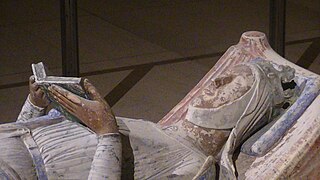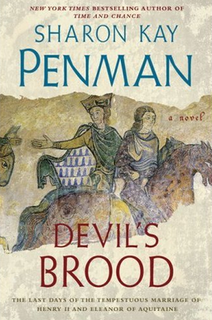
Eleanor of Aquitaine was queen consort of France (1137–1152) and England (1154–1189) and duchess of Aquitaine in her own right (1137–1204). As the heir of the House of Poitiers, rulers in southwestern France, she was one of the wealthiest and most powerful women in western Europe during the High Middle Ages. She was patron of literary figures such as Wace, Benoît de Sainte-Maure, and Bernart de Ventadorn. She led armies several times in her life and was a leader of the Second Crusade.

Philip II, byname Philip Augustus, was King of France from 1180 to 1223. His predecessors had been known as kings of the Franks, but from 1190 onward, Philip became the first French monarch to style himself "King of France". The son of King Louis VII and his third wife, Adela of Champagne, he was originally nicknamed Dieudonné (God-given) because he was a first son and born late in his father's life. Philip was given the epithet "Augustus" by the chronicler Rigord for having extended the crown lands of France so remarkably.

Richard I was King of England from 1189 until his death. He also ruled as Duke of Normandy, Aquitaine and Gascony, Lord of Cyprus, and Count of Poitiers, Anjou, Maine, and Nantes, and was overlord of Brittany at various times during the same period. He was the third of five sons of King Henry II of England and Duchess Eleanor of Aquitaine and seemed unlikely to become king, but all his brothers except the youngest, John, predeceased their father. Richard is known as Richard Cœur de Lion or Richard the Lionheart because of his reputation as a great military leader and warrior. The troubador Bertran de Born also called him Richard Oc-e-Non, possibly from a reputation for terseness.

Louis VII, called the Younger or the Young, was King of the Franks from 1137 to 1180. He was the son and successor of King Louis VI, hence his nickname, and married Duchess Eleanor of Aquitaine, one of the wealthiest and most powerful women in western Europe. The marriage temporarily extended the Capetian lands to the Pyrenees, but was annulled in 1152 after no male heir was produced.
The Lion in Winter is a 1966 play by James Goldman, depicting the personal and political conflicts of Henry II of England, his wife Eleanor of Aquitaine, their children and their guests during Christmas 1183. It premiered on Broadway at the Ambassador Theatre on March 3, 1966, starring Robert Preston and Rosemary Harris, who won a Tony Award for her portrayal of Eleanor. It was adapted by Goldman into an Academy Award-winning 1968 film of the same name, starring Peter O'Toole and Katharine Hepburn. The play has been produced numerous times, including Broadway and West End revivals.

Henry the Young King was the eldest surviving son of Henry II of England and Eleanor of Aquitaine. Beginning in 1170, he was titular King of England, Duke of Normandy, Count of Anjou and Maine. Henry the Young King is the only King of England since the Norman Conquest to be crowned during his father's reign, but was frustrated by his father's refusal to grant him meaningful autonomous power. He died aged 28, six years before his father, leaving his brother Richard to become the next king.

Berengaria of Navarre was queen of England as the wife of Richard I of England. She was the eldest daughter of Sancho VI of Navarre and Sancha of Castile. As is the case with many of the medieval English queens, relatively little is known of her life.

Geoffrey II was Duke of Brittany and 3rd Earl of Richmond between 1181 and 1186, through his marriage with the heiress Constance. Geoffrey was the fourth of five sons of Henry II, King of England and Eleanor, Duchess of Aquitaine.
Geoffrey was an illegitimate son of Henry II, King of England, who became bishop-elect of Lincoln and archbishop of York. The identity of his mother is uncertain, but she may have been named Ykenai. Geoffrey held several minor clerical offices before becoming Bishop of Lincoln in 1173, though he was not ordained as a priest until 1189. In 1173–1174, he led a campaign in northern England to help put down a rebellion by his legitimate half-brothers; this campaign led to the capture of William, King of Scots. By 1182, Pope Lucius III had ordered that Geoffrey either resign Lincoln or be consecrated as bishop; he chose to resign and became Chancellor instead. He was the only one of Henry II's sons present at the king's death.
The Revolt of 1173–74 was a rebellion against King Henry II of England by three of his sons, his wife Eleanor of Aquitaine, and their rebel supporters. The revolt ended in failure after eighteen months; Henry's rebellious family members had to resign themselves to his continuing rule and were reconciled to him.

The Angevin Empire describes the possessions of the Angevin kings of England who held lands in England and France during the 12th and 13th centuries. Its rulers were Henry II, Richard I (r. 1189–1199), and John (r. 1199–1216). The Angevin Empire is an early example of a composite state.
Alys of France, Countess of Vexin was the daughter of Louis VII, King of France and his second wife, Constance of Castile.

The House of Plantagenet was a royal house which originated from the lands of Anjou in France. The name Plantagenet is used by modern historians to identify four distinct royal houses: the Angevins, who were also counts of Anjou; the main body of the Plantagenets following the loss of Anjou; and the Plantagenets' two cadet branches, the houses of Lancaster and York. The family held the English throne from 1154, with the accession of Henry II, until 1485, when Richard III died in battle.

The Lion in Winter is a 1968 British historical drama film set around the Christmas of 1183, about political and personal turmoil among the royal family of Henry II of England, his wife Eleanor of Aquitaine, their children, and their guests. It is based on the 1966 Broadway play of the same name by James Goldman.
The Devil's Crown is a BBC television series which dramatised the reigns of three medieval Kings of England: Henry II and his sons Richard the Lionheart and John Lackland. It is also known as La couronne du Diable in French.

Henry II, also known as Henry Curtmantle, Henry FitzEmpress or Henry Plantagenet, was King of England from 1154 to his death. He was the first king of the House of Plantagenet. King Louis VII of France made him Duke of Normandy in 1150. Henry became Count of Anjou and Maine upon the death of his father, Geoffrey of Anjou, in 1151. His marriage in 1152 to Eleanor, Duchess of Aquitaine, whose marriage to Louis VII had recently been annulled, made him Duke of Aquitaine. He became Count of Nantes by treaty in 1185. Before he was 40 he controlled England, large parts of Wales, the eastern half of Ireland and the western half of France—an area that would later come to be called the Angevin Empire. At various times, Henry also partially controlled Scotland, Wales and the Duchy of Brittany.

Devil's Brood is a historical novel written by Sharon Kay Penman, published in 2008, and is the third volume in her Plantagenet series, preceded by When Christ and His Saints Slept and Time and Chance, and followed by Lionheart (2011).
Richard The Lionheart is a 2013 film, starring Greg Maness as Richard the Lionheart, Malcolm McDowell as King Henry II and Andrea Zirio as Henry the Young.

The Angevins were a royal house of French origin that ruled England in the 12th and early 13th centuries; its monarchs were Henry II, Richard I and John. In the 10 years from 1144, two successive counts of Anjou in France, Geoffrey and his son, the future Henry II, won control of a vast assemblage of lands in western Europe that would last for 80 years and would retrospectively be referred to as the Angevin Empire. As a political entity this was structurally different from the preceding Norman and subsequent Plantagenet realms. Geoffrey became Duke of Normandy in 1144 and died in 1151. In 1152 his heir, Henry, added Aquitaine by virtue of his marriage to Eleanor of Aquitaine. Henry also inherited the claim of his mother, Empress Matilda, the daughter of King Henry I, to the English throne, to which he succeeded in 1154 following the death of King Stephen.
Alys of France appears in Eleanor Anne Porden's As "Alasia of France," 1822 epic poem Cœur de Lion. In it, Alys joins the army of Saladin during the Third Crusade to avenge herself on Richard for rejecting her.












